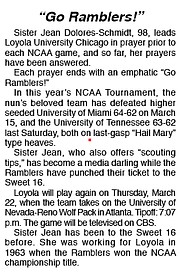1963 NCAA game went down in the record books for different reasons
3/23/2018, 9:43 a.m.
On March 15, 1963, an NCAA Tournament basketball game was played in which both schools could claim victory of sorts.
Loyola University Chicago won on the court with four African-American starters, which was largely unheard of for that era at the largely white school. And all-white Mississippi State University won in terms of mending tattered race relations.
Because of its far-reaching social significance, the Loyola-MSU NCAA Mideast Region matchup has come to be known as the “Game of Change.”
Amid much drama and controversy, it marked the first time a Southeastern Conference school had played an integrated squad in a high-profile matchup.
In an interview with the Chicago Tribune, here’s how Loyola Ramblers forward Jerry Harkness recalls it:
“I get there and see these flashbulbs – pop, pop, pop – and I thought, ‘Hmmm, this is more than a game.’ It just felt more like this is history.”
Loyola, finishing 29-2, went on to win the national title, upsetting two-time defending champion University of Cincinnati 60-58 in an overtime thriller in Louisville.
But the real upset was at the regional game in East Lansing, Mich., — and not that Loyola won, but that the game came off at all.
A history lesson is needed to paint this picture.
It was 1963. Four young black girls were killed when their church was bombed in Birmingham, Ala.
It was the year of the March on Washington for Jobs and Freedom in which Dr. Martin Luther King Jr. gave his famous “I Have a Dream” speech at the Lincoln Memorial.
It was the year civil rights activist Medgar Evers was assassinated in Jackson, Miss., by a white supremacist.
It was also the year that Alabama Gov. George Wallace stood in the doorway of the University of Alabama to block the enrollment of African-Americans from the state-supported school to keep his inaugural promise, “Segregation now, segregration tomorrow, segregation forever.”
In Mississippi, vocal segregationist Gov. Ross Barnett ordered an injunction, refusing to allow state-supported schools to face sports opponents with African-Americans on the team.
On three occasions prior to 1963, the Mississippi State University Bulldogs declined NCAA bids to avoid playing racially integrated teams.
Finally, in 1963, MSU Coach Babe McCarthy and President Dean W. Colvard had had enough. Stealing off in the middle of the night to avoid possible arrest, Coach McCarthy took his team via a private plane to the NCAA regional game in East Lansing, where history would be made.
Following the team’s loss to Loyola, the Bulldogs got a surprisingly warm welcome back home in Starkville, Miss. No one was fired. No one was arrested. Life went on, some would say, better than before.
Mississippi State had earned a first round bye into the NCAA Tournament as the SEC champion automatic qualifier.
Meanwhile, the Loyola Ramblers were on a roll that never stopped rolling until the team was presented with the national championship trophy.
In order, Loyola defeated Tennessee Tech, Mississippi State, Illinois, Duke and, finally, Cincinnati in a tense overtime struggle.
In the championship game, the five Loyola starters all played the full 45 minutes. Since then, all five have had their jersey numbers retired at the Jesuit school in Chicago.
Harkness and Ron Miller, both from Bronx, N.Y., and Les Hunter and Vic Rouse, both from Nashville, were the African-American starters along with white Chicagoan Johnny Egan.
“I knew it was important to win, to make a statement on the court that we could play with anyone,” Hunter told The Tribune. “We kind of ran up scores on all-white teams to make a statement. I was conscious of it.”
At the semifinals, Loyola pounded all-white Duke University, but made friends in the process. Because the Ramblers had no pep band in Louisville for the game, the Duke band, impressed by Loyola’s talent and sportsmanship, stuck around another day and played for Loyola.
In the finals, Loyola’s four African-American starters were up against three African-American starters for Cincinnati, marking the first time in an NCAA Tournament that black athletes out-numbered white players.
But it was at the regionals with Loyola playing Mississippi State that more important history was made in 1963.
“You don’t realize at the time what you’ve done — even a little bit — for race relations,” Harkness told The Tribune. “That comes on later.”
The score for that game? Loyola 61, Mississippi State 51. It only goes to show that sometimes the score really doesn’t matter.








